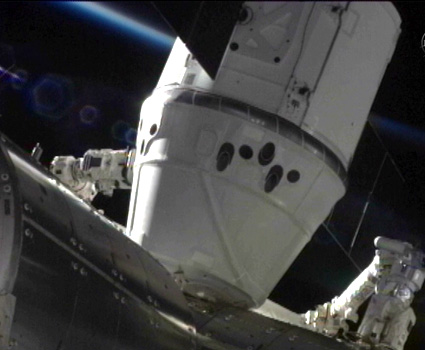After a number of delays and even a cancellation with less than one second to go before launch, SpaceX’s Dragon spacecraft successfully docked with the International Space Station on Friday. The mission marks the first commercial space effort since NASA discontinued its space shuttle program last year.
The Falcon 9 rocket launched without issue on Tuesday of this week, carrying non-critical cargo meant for the ISS, along with the ashes of actor James Doohan, best known as chief engineer Scotty in the original Star Trek series. SpaceX’s original launch on May 19th was aborted at the last second after abnormally high pressures were discovered in one of the engines due to faulty check valve.
The unmanned vessel docked successfully with the International Space Station following three days of travel and a series of test approaches to make sure the craft posed no structural harm to the station. NASA astronauts aboard the ISS took hold of the vehicle via a robot arm, finally attaching the space craft to the bottom of the station around 4 pm GMT on Friday. Pre-docking maneuverability tests were conducted remotely by NASA mission control in Houston, as well as the SpaceX headquarters in California.
Though the Dragon is capable of holding more than 7,000 lbs of supplies, only 1,000 lbs of non-critical cargo have been sent up on the first mission, which include mostly fresh clothes, water, and food. Astronauts aboard the ISS will spend 25 hours across the next two and a half weeks unloading supplies from the craft, sending about 1,300 lbs of used materials back to Earth. After the shuttle has completed its resupply mission it is expected to reenter Earth’s orbit off the west coast of the United States.
After years of testing and development, the success of SpaceX’s landmark mission has proven commercial space flight to be a feasible solution in the face of a post-shuttle program NASA. With ambitious space projects continuing to pop up every few months, including a recently announced Google-backed asteroid mining initiative, commercial missions like this are just the beginning of a progressive new era of space exploration.
Image credit: NASA TV







